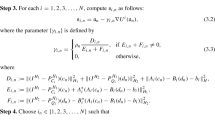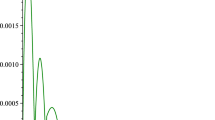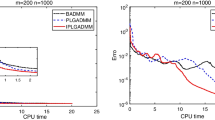Abstract
In this paper, first we propose a general modulus-based matrix splitting iteration method for solving horizontal linear complementarity problems. In order to improve the computing efficiency, we further propose a preconditioned general modulus-based matrix splitting iteration method. We establish the convergence theorems when the coefficient matrices are (symmetric) positive definite matrices and H+-matrices, respectively. Numerical results show that the proposed preconditioned general modulus-based matrix splitting iteration method is superior than some existing methods and the general modulus-based matrix splitting iteration method.















Similar content being viewed by others
References
Cottle, R.W., Pang, J.S., Stone, R.E.: The Linear Complementarity Problem. Classics in Applied Mathematics SIAM, Philadelphia (2009)
Tütüncü, R.H., Todd, M.J.: Reducing horizontal linear complementarity problems. Linear Algebra Appl. 223(224), 717–729 (1995)
Schutter, B.D., Heemels, W., Bemporad, A.: On the equivalence of linear complementarity problems. Oper. Res. Lett 30, 212–222 (2002)
Fujisawa, T., Kuh, E.S.: Piecewise-linear theory of nonlinear networks. SIAM J. Appl. Math 22, 307–328 (1972)
Fujisawa, T., Kuh, E.S.: A sparse matrix method for analysis of piecewise-linear resistive networks. IEEE Trans. Circ. Theory 19, 571–584 (1972)
Gao, X., Wang, J.: Analysis and application of a one-layer neural network for solving horizontal linear complementarity problems. Int. J. Comput. Int. Sys 7(4), 724–732 (2014)
Giacopini, M., Fowell, M., Dini, D., Strozzi, A.: A mass-conserving complementarity formulation to study lubricant films in the presence of cavitation. J. Tribol. 041702, 132 (2010)
Sun, M.: Monotonicity of Mangasarian’s iterative algorithm for generalized linear complementarity problems. J. Math. Anal. Appl. 144, 474–485 (1989)
Sun, M.: Singular control problems in bounded intervals. Stochastics 21, 303–344 (1987)
Zhang, Y.: On the convergence of a class on infeasible interior-point methods for the horizontal linear complementarity problem. SIAM J. Optimiz. 4(1), 208–227 (1994)
Ralph, D.: A stable homotopy approach to horizontal linear complementarity problems. Control Cybern. 31, 575–600 (2002)
Gao, X., Wang, J.: Analysis and application of a one-layer neural network for solving horizontal linear complementarity problems. Int. J. Comput. Int. Sys 7(4), 724–732 (2014)
Gao, X., Wang, J.: A neural network for a class of horizontal linear complementarity problems. In: Society, I.C. (Ed.) Seventh international conference on computational intelligence and security (2011)
Mezzadri, F., Galligani, E.: Splitting methods for a class of horizontal linear complementarity problems. J. Optim. Theory Appl 180, 500–517 (2019)
Ke, Y.-F., Ma, C.-F., Zhang, H.: The modulus-based matrix splitting iteration method for second-order cone linear complementarity problems. Numer. Algorithms 79, 1283–1303 (2018)
Huang, N., Ma, C.-F.: The modulus-based matrix splitting algorithms for a class of weakly nonlinear complementarity problems. Numer. Linear Algebra Appl. 23, 558–569 (2016)
Mezzadri, F., Galligani, E.: Modulus-based matrix splitting methods for horizontal linear complementarity problems. Numer. Algorithms 83(1), 201–219 (2020)
Zheng, H., Vong, S.: On the modulus-based successive overrelaxation iteration method for horizontal linear complementarity problems arising from hydrodynamic lubrication. Appl. Math. Comput. 126125, 402 (2021)
Mezzadri, F., Galligani, E.: On the convergence of modulus-based matrix splitting methods for horizontal linear complementarity problems in hydrodynamic lubrication. Math. Comput. Simul. 176, 226–242 (2020)
Zheng, H., Vong, S.: A two-step modulus-based matrix splitting iteration method for horizontal linear complementarity problems. Numer. Algorithms 86, 1791–1810 (2020)
Mezzadri, F., Galligani, E.: A modulus-based nonsmooth Newton’s method for solving horizontal linear complementarity problems. Optimiz. Lett. 15, 1785–1798 (2021)
Liao, S.-W., Zhang, G.-F., Liang, Z.-Z.: A generalized variant of two-sweep modulus-based matrix splitting iteration method for solving horizontal linear complementarity problems. Numer. Algorithms 90, 1279–1303 (2022)
Mezzadri, F.: Modulus-based synchronous multisplitting methods for solving horizontal linear complementarity problems on parallel computers. Numer. Linear Algebra Appl. 27(5), 1–15 (2020)
Berman, A., Plemmons, R.J.: Nonnegative matrices in the mathematical sciences, SIAM. Phimadelphia. PA (1994)
Frommer, A., Mayer, G.: Convergence of relaxed parallel multisplitting methods. Linear Algebra Appl. 119, 141–152 (1989)
Sznajder, R., Gowda, M.S.: Generalizations of P0- and P-properties; extended vertical and horizontal linear complementarity problems. Linear Algebra Appl. 223-224, 695–715 (1995)
Dai, P.-F., Li, J.-C., Bai, J.-C., Qiu, J.-M.: A preconditioned two-step modulus-based matrix splitting iteration method for solving linear complementarity problem. Appl. Math. Comput. 348, 542–551 (2019)
Ren, H., Wang, X., Tang, X.-B., Wang, T.: A preconditioned general two-step modulus-based matrix splitting iteration method for linear complementarity problems of H+-matrices. Numer. Algorithms 82, 969–986 (2019)
Li, W., Zheng, H.: A preconditioned modulus-based iteration method for solving linear complementarity problems of H-matrices. Linear and Multilinear Algebra 64(7), 1390–1403 (2016)
Wu, X.-P., Peng, X.-F., Li, W.: A preconditioned general modulus-based matrix splitting iteration method for linear complementarity problems of H-matrices,. Numer. Algorithms 79, 1131–1146 (2018)
Mezzadri, F., Galligani, E.: A generalization of irreducibiliy and diagonal dominance with applications to horizontal and vertical linear complementarity problems. Linear Algebra Appl. 621, 214–234 (2021)
Funding
This work was supported by the National Natural Science Foundation of China (No. 11771193) the Fundamental Research Funds for the Central Universities, No.lzujbky-2022-05.
Author information
Authors and Affiliations
Corresponding author
Ethics declarations
Conflict of interest
The authors declare no competing interests.
Additional information
Data availability
Data sharing not applicable to this article as no datasets were generated or analyzed during the current study.
Publisher’s note
Springer Nature remains neutral with regard to jurisdictional claims in published maps and institutional affiliations.
Rights and permissions
Springer Nature or its licensor (e.g. a society or other partner) holds exclusive rights to this article under a publishing agreement with the author(s) or other rightsholder(s); author self-archiving of the accepted manuscript version of this article is solely governed by the terms of such publishing agreement and applicable law.
About this article
Cite this article
Liao, SW., Zhang, GF. & Liang, ZZ. A preconditioned general modulus-based matrix splitting iteration method for solving horizontal linear complementarity problems. Numer Algor 93, 919–947 (2023). https://doi.org/10.1007/s11075-022-01447-z
Received:
Accepted:
Published:
Issue Date:
DOI: https://doi.org/10.1007/s11075-022-01447-z




